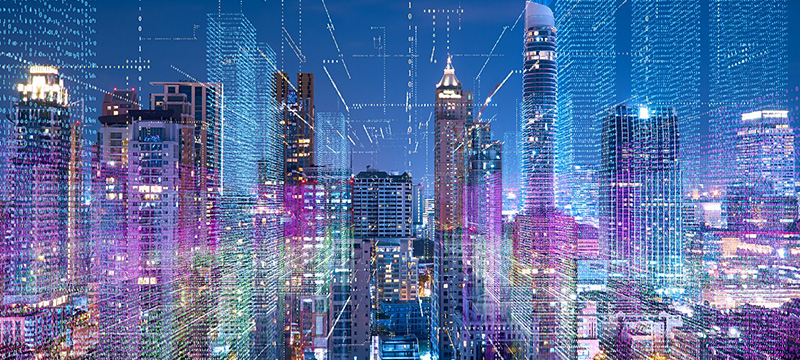The concept of smart cities is rapidly becoming a reality, thanks to the transformative power of the Internet of Things (IoT). IoT is fundamentally altering how cities operate, bringing increased efficiency, sustainability, and improved quality of life to urban dwellers. In this article, we will explore the role of IoT in smart cities, its key applications, benefits, challenges, and the exciting future it holds for urban development.
The IoT Revolution in Smart Cities
A smart city leverages technology to enhance urban living, addressing challenges such as traffic congestion, pollution, and energy consumption. IoT plays a pivotal role in this transformation by connecting a vast network of devices, sensors, and infrastructure to collect and analyze data, enabling cities to make informed decisions.
Key Applications of IoT in Smart Cities
1. Smart Traffic Management
IoT sensors and cameras monitor traffic flow, congestion, and accidents. This data is analyzed to optimize traffic signal timing, reroute vehicles, and reduce congestion. Smart parking systems can also guide drivers to available parking spots, reducing traffic and emissions.
2. Public Safety and Security
IoT enables cities to enhance public safety and security through smart surveillance cameras, gunshot detection systems, and crowd monitoring. These technologies can identify and respond to emergencies in real-time.
3. Energy Management
IoT helps cities manage energy resources more efficiently. Smart grids enable real-time monitoring and control of electricity distribution, while IoT sensors in streetlights adjust lighting levels based on weather conditions and pedestrian activity, saving energy.
4. Waste Management
IoT sensors in waste bins can signal when they are full, optimizing waste collection routes. Smart recycling stations can also encourage recycling by providing incentives to users.
5. Environmental Monitoring
Cities can use IoT to monitor air and water quality, noise levels, and weather conditions. This data helps manage pollution, reduce emissions, and respond to environmental concerns promptly.
6. Healthcare
IoT-based healthcare solutions enable remote patient monitoring and faster emergency response. In smart cities, medical data can be transmitted from patients’ homes to healthcare providers, improving patient care.
7. Urban Planning
City planners use IoT data to assess land use, urban density, and infrastructure needs. This information aids in developing sustainable, future-ready urban environments.
8. Water Management
IoT sensors can detect water leaks in real-time, helping conserve water resources. Smart irrigation systems adjust watering schedules based on weather data, reducing water waste.
Benefits of IoT in Smart Cities
The integration of IoT in smart cities offers numerous advantages:
1. Enhanced Efficiency
IoT helps streamline city operations, reduce waste, and optimize resource allocation. This leads to improved efficiency and cost savings.
2. Improved Quality of Life
Smart cities prioritize the well-being of residents. IoT applications in healthcare, safety, and environmental monitoring lead to a higher quality of life for urban dwellers.
3. Sustainability
By monitoring and managing resources more efficiently, IoT contributes to sustainable urban development, reducing energy consumption, pollution, and waste.
4. Economic Growth
Smart cities attract businesses and investments, fostering economic growth and job opportunities.
5. Public Engagement
IoT encourages citizen engagement through digital platforms, allowing residents to provide feedback, participate in decision-making, and access services more easily.
Challenges and Considerations
While IoT in smart cities offers numerous benefits, it also poses challenges and considerations:
1. Data Security and Privacy
Collecting and transmitting vast amounts of data from urban environments raise concerns about data security and privacy. Safeguarding this information is crucial.
2. Infrastructure Investment
Implementing IoT in smart cities requires significant investment in infrastructure, such as sensors, connectivity, and data centers.
3. Interoperability
IoT devices and systems must be compatible and standardized to ensure seamless data exchange and integration. Common protocols and standards are essential for achieving this.
4. Regulatory Compliance
Smart city IoT systems must adhere to regulatory requirements, particularly regarding data protection and privacy.
5. Citizen Engagement
Citizen participation is vital in smart cities. It is crucial to ensure that the benefits of IoT are accessible to all residents and that their concerns are addressed.
The Future of IoT in Smart Cities
As technology continues to advance, the future of IoT in smart cities looks promising. Here are some trends and developments to watch for:
1. 5G Connectivity
The rollout of 5G networks will provide faster and more reliable connectivity, enabling real-time data transmission and better support for IoT applications.
2. Artificial Intelligence (AI)
IoT and AI will work hand in hand to analyze vast amounts of data, offering insights for various applications, from traffic management to predictive maintenance.
3. Blockchain Technology
Blockchain can be used to enhance the security and integrity of IoT data in smart cities, ensuring that data remains accurate and private.
4. Autonomous Systems
IoT-enabled smart cities will contribute to the development of autonomous systems, such as self-driving vehicles and drones, improving efficiency and reducing congestion.
5. Enhanced Data Analytics
Advanced data analytics will provide cities with more profound insights into urban patterns, enabling proactive decision-making and real-time response to challenges.
Conclusion
The Internet of Things is revolutionizing smart cities by offering increased efficiency, sustainability, and a higher quality of life for urban residents. Challenges related to data security, infrastructure investment, and regulatory compliance must be addressed to ensure that the benefits of IoT in smart cities are fully realized.
As IoT technology continues to evolve, it will remain a driving force in urban development, offering a glimpse into a future where cities are more efficient, sustainable, and responsive to the needs of their residents, ultimately improving the quality of life for all.
The post Pioneering Progress: The Internet of Things (IoT) in Smart Cities appeared first on IoT Business News.






























